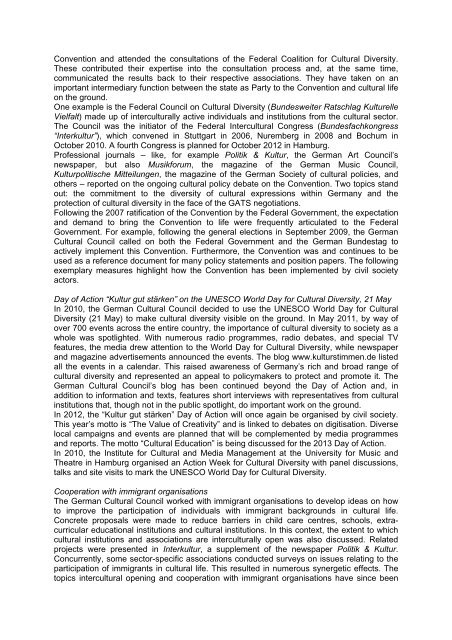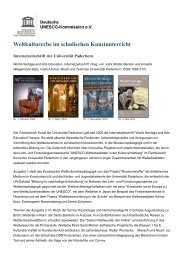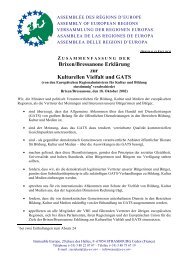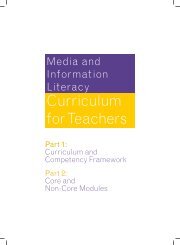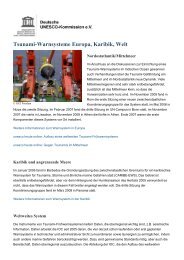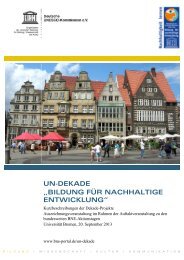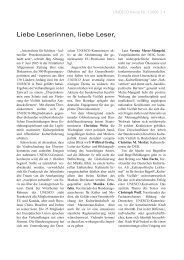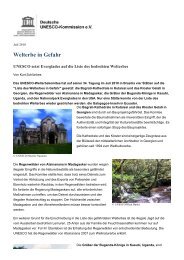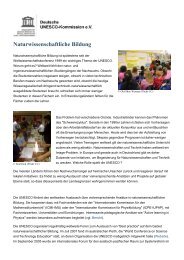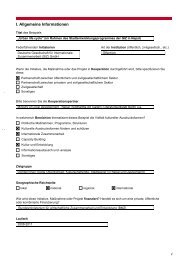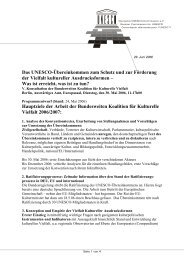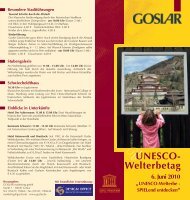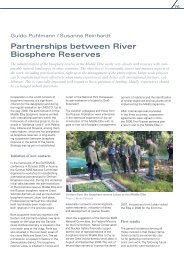Annex Form - Deutsche UNESCO-Kommission
Annex Form - Deutsche UNESCO-Kommission
Annex Form - Deutsche UNESCO-Kommission
You also want an ePaper? Increase the reach of your titles
YUMPU automatically turns print PDFs into web optimized ePapers that Google loves.
Convention and attended the consultations of the Federal Coalition for Cultural Diversity.<br />
These contributed their expertise into the consultation process and, at the same time,<br />
communicated the results back to their respective associations. They have taken on an<br />
important intermediary function between the state as Party to the Convention and cultural life<br />
on the ground.<br />
One example is the Federal Council on Cultural Diversity (Bundesweiter Ratschlag Kulturelle<br />
Vielfalt) made up of interculturally active individuals and institutions from the cultural sector.<br />
The Council was the initiator of the Federal Intercultural Congress (Bundesfachkongress<br />
“Interkultur”), which convened in Stuttgart in 2006, Nuremberg in 2008 and Bochum in<br />
October 2010. A fourth Congress is planned for October 2012 in Hamburg.<br />
Professional journals – like, for example Politik & Kultur, the German Art Council’s<br />
newspaper, but also Musikforum, the magazine of the German Music Council,<br />
Kulturpolitische Mitteilungen, the magazine of the German Society of cultural policies, and<br />
others – reported on the ongoing cultural policy debate on the Convention. Two topics stand<br />
out: the commitment to the diversity of cultural expressions within Germany and the<br />
protection of cultural diversity in the face of the GATS negotiations.<br />
Following the 2007 ratification of the Convention by the Federal Government, the expectation<br />
and demand to bring the Convention to life were frequently articulated to the Federal<br />
Government. For example, following the general elections in September 2009, the German<br />
Cultural Council called on both the Federal Government and the German Bundestag to<br />
actively implement this Convention. Furthermore, the Convention was and continues to be<br />
used as a reference document for many policy statements and position papers. The following<br />
exemplary measures highlight how the Convention has been implemented by civil society<br />
actors.<br />
Day of Action “Kultur gut stärken” on the <strong>UNESCO</strong> World Day for Cultural Diversity, 21 May<br />
In 2010, the German Cultural Council decided to use the <strong>UNESCO</strong> World Day for Cultural<br />
Diversity (21 May) to make cultural diversity visible on the ground. In May 2011, by way of<br />
over 700 events across the entire country, the importance of cultural diversity to society as a<br />
whole was spotlighted. With numerous radio programmes, radio debates, and special TV<br />
features, the media drew attention to the World Day for Cultural Diversity, while newspaper<br />
and magazine advertisements announced the events. The blog www.kulturstimmen.de listed<br />
all the events in a calendar. This raised awareness of Germany’s rich and broad range of<br />
cultural diversity and represented an appeal to policymakers to protect and promote it. The<br />
German Cultural Council’s blog has been continued beyond the Day of Action and, in<br />
addition to information and texts, features short interviews with representatives from cultural<br />
institutions that, though not in the public spotlight, do important work on the ground.<br />
In 2012, the “Kultur gut stärken” Day of Action will once again be organised by civil society.<br />
This year’s motto is “The Value of Creativity” and is linked to debates on digitisation. Diverse<br />
local campaigns and events are planned that will be complemented by media programmes<br />
and reports. The motto “Cultural Education” is being discussed for the 2013 Day of Action.<br />
In 2010, the Institute for Cultural and Media Management at the University for Music and<br />
Theatre in Hamburg organised an Action Week for Cultural Diversity with panel discussions,<br />
talks and site visits to mark the <strong>UNESCO</strong> World Day for Cultural Diversity.<br />
Cooperation with immigrant organisations<br />
The German Cultural Council worked with immigrant organisations to develop ideas on how<br />
to improve the participation of individuals with immigrant backgrounds in cultural life.<br />
Concrete proposals were made to reduce barriers in child care centres, schools, extracurricular<br />
educational institutions and cultural institutions. In this context, the extent to which<br />
cultural institutions and associations are interculturally open was also discussed. Related<br />
projects were presented in Interkultur, a supplement of the newspaper Politik & Kultur.<br />
Concurrently, some sector-specific associations conducted surveys on issues relating to the<br />
participation of immigrants in cultural life. This resulted in numerous synergetic effects. The<br />
topics intercultural opening and cooperation with immigrant organisations have since been


